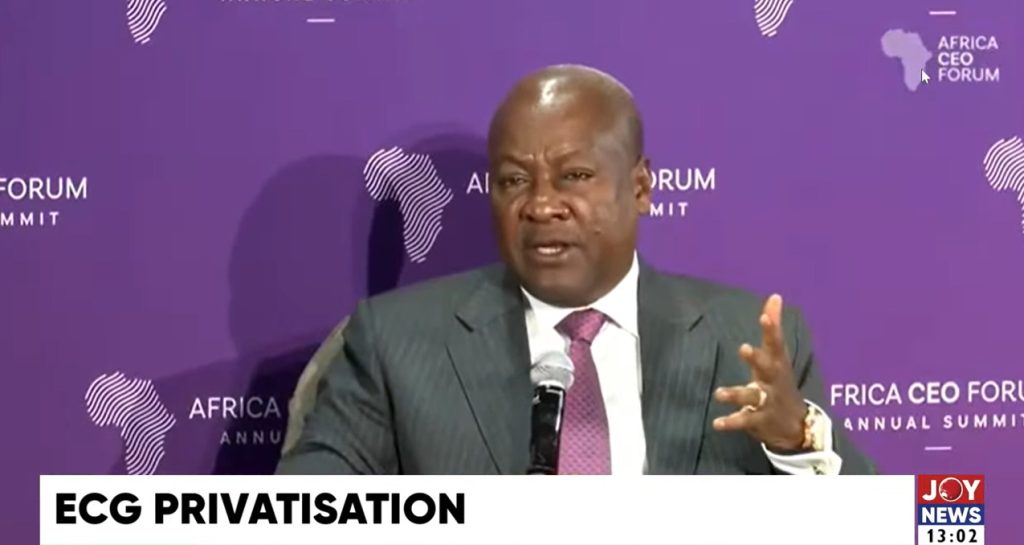The Private Sector Participation (PSP) Steering Committee has submitted its report to the government, outlining three possible models for involving the private sector in the billing and metering operations of the Electricity Company of Ghana (ECG).
President John Mahama revealed this during the Africa CEO Forum held in Abidjan, Côte d’Ivoire.
Speaking on the issue, he explained that the proposals from the PSP Steering Committee will be reviewed by the cabinet before a final decision is made.
“We just got the report from the committee that’s advising us on how to do it. And they gave us three options,” President Mahama said.
He outlined the three proposals presented: “One option was to go to one concession holder for the whole country to do the billing and metering. The other was to, if I remember, divide into concession areas and have multiple partners working with us in this billing and metering.”
He made it clear that the process is still in the early stages and that the government has not made any final decisions. “The government is yet to make a decision. It’s going to come to the cabinet. And the cabinet will decide on which option we’re going for. And then we’ll do an expression of interest.”
President Mahama has called for a comprehensive reform of the electricity sector, pointing to inefficiencies in ECG’s revenue collection system.
“We need to clean the slate, but in cleaning that slate, we must look at the whole value chain, because a lot of the problem is coming from downstream, the distribution end. Because the state-owned utility, ECG, is not as efficient in collecting revenue,” he explained.
He highlighted that ECG is currently experiencing technical and commercial losses of about 40%. “I think it’s only a state-owned enterprise that can survive when you’re losing 40% of your revenue. And so we are going into the phase of private sector participation in the billing and metering to bring private sector efficiency in the revenue collection so that we can pay for the power we take from the independent power producers,” he noted.
President Mahama stressed that any move to involve external companies would require local involvement. “There must be Ghanaian participation. There must be local participation. So even if it’s an international company bidding, it must have a local partner,” he said.
Turning to energy sustainability, President Mahama expressed confidence in Ghana’s transition to cleaner energy sources. He said Ghana could eliminate fossil fuels from electricity generation within the next four years, relying instead on natural gas and solar power.
“Ghana has a comparative advantage to produce solar because we have abundant sunlight. Indeed, if we could export sunlight, we would be one of the richest countries in the world,” he stated.
He pointed out that licenses have already been granted to several companies to set up large-scale solar projects ranging from 20 to 100 megawatts. “We’ve given licenses to several companies to begin to set up large-scale solar, 20 megawatts, 50 megawatts, and 100 megawatts, so that we can catch up with at least a 10% power from renewable sources,” he said.
President Mahama also encouraged the development of household and mini-grid solar systems and suggested Ghana should adopt policies similar to those in parts of Europe. “The time has come also for us to follow in the footsteps of some of the Scandinavian countries, including Germany, where people can invest in solar in their households and feed any excess into the national grid.”
“I believe that within the next four years, with the kind of investments that are taking place, we should be able to generate 100% on natural gas. And if we put in more solar, then we’re going to rely mainly on those two,” he added.
DISCLAIMER: The Views, Comments, Opinions, Contributions and Statements made by Readers and Contributors on this platform do not necessarily represent the views or policy of Multimedia Group Limited.
DISCLAIMER: The Views, Comments, Opinions, Contributions and Statements made by Readers and Contributors on this platform do not necessarily represent the views or policy of Multimedia Group Limited.


